Update from Anna Jacobson, 2023 Fryer Library Fellow
In this guest post Dr Anna Jacobson, 2023 Fryer Library Fellow, describes discovering the Rudolf Pekarek Collection and her research process.
Discovering the Rudolf Pekarek Collection and My Research Process – Anna Jacobson
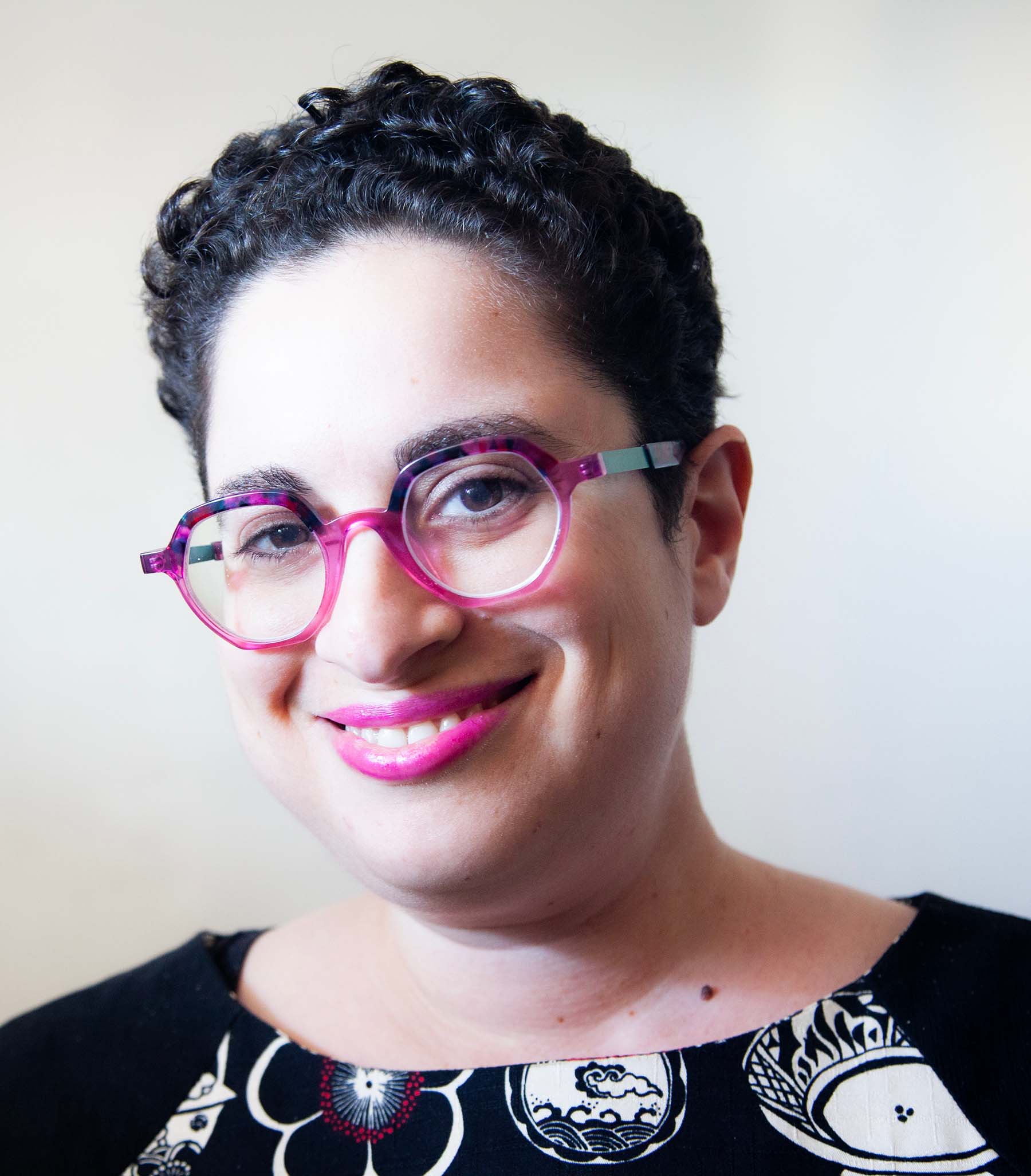 I am grateful to have been awarded the 2023 Fryer Library Fellowship to research the Rudolf Pekarek Collection. This extensive collection of 10 scrapbooks, ephemera, correspondence, and concert programs from Rudolf Pekarek, a conductor and musician from Czechoslovakia, forms the basis of my project.
I am grateful to have been awarded the 2023 Fryer Library Fellowship to research the Rudolf Pekarek Collection. This extensive collection of 10 scrapbooks, ephemera, correspondence, and concert programs from Rudolf Pekarek, a conductor and musician from Czechoslovakia, forms the basis of my project.
This blog post will delve into how I first discovered this collection at the Fryer Library, and my research process.
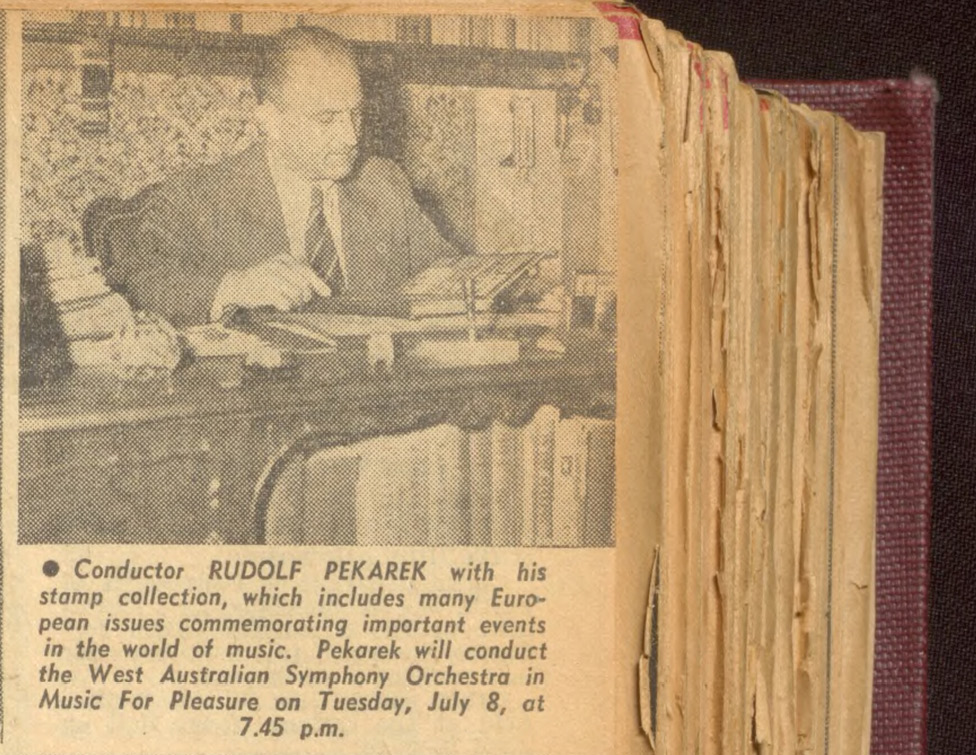
Fig. #1, Australian Broadcasting Commission. Vol. 14 No. 27 (5 July 1952), ABC weekly, Detail of clipping retrieved from National Library of Australia, Trove.
Discovery
Rudolf Pekarek was a Holocaust survivor who founded the Film, Opera, Koncert (FOK) Symphony Orchestra in Prague in 1934. He survived Łódź Ghetto and Auschwitz-Birkenau.
While I was working as a Collections Assistant for Dr Lauren Chalk, the Curator and Head of Collections of the Queensland Holocaust Museum, I learned Pekarek was deported to the Łódź Ghetto in 1941 and did not tell anyone he was a musician - his wife Tereza (Terry) recalled that the ghetto musicians were among the first to be sent to Auschwitz.
While Rudolf was working in the yard, which was in a section near the women’s forced labour camp, he started to whistle. It was the tune from Dvořák’s ‘New World Symphony’. Terry whistled the rest of the tune in reply and although he could not see her, he knew she was alive.
After being liberated by Soviet forces in 1945, Rudolf was reunited with Terry in Prague. Both had lost their families. They migrated to Australia in 1948. Pekarek conducted the West Australian Symphony Orchestra from 1949 and was the conductor of the Queensland Symphony Orchestra from 1954 to 1967.
I first viewed the Rudolf Pekarek Collection at the Fryer Library in late 2022, as part of my work with the Queensland Holocaust Museum with Dr Lauren Chalk. I looked through the scrapbooks that Rudolf had created (held in Box 16), and the extensive archive of concert programs that listed the music from Rudolf Pekarek’s concerts.
I noticed that Dvořák’s works were listed quite frequently and remembered the newspaper article I had read from the Sydney Jewish Museum, about how Rudolf had whistled Dvořák and discovered his wife was alive.
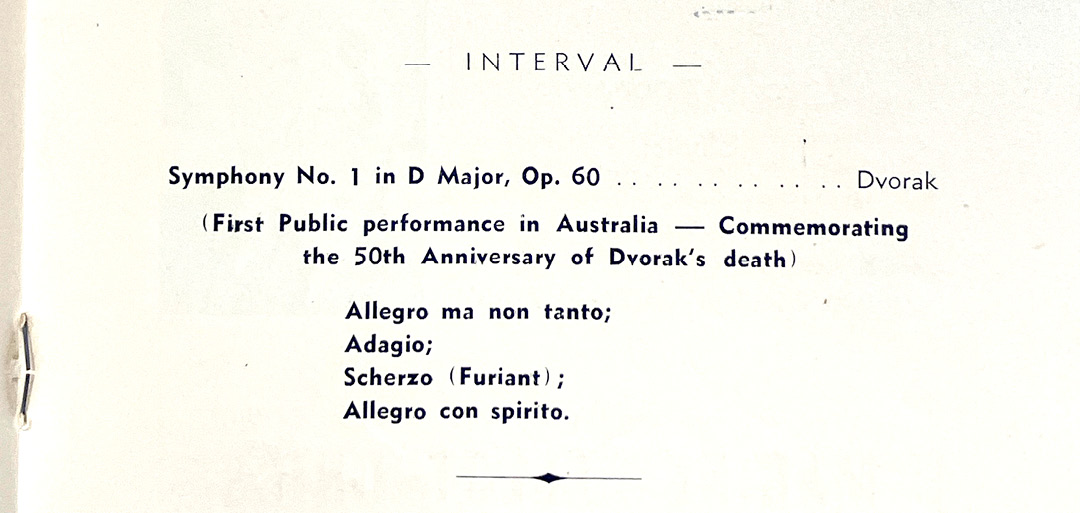
- Interval -
Symphony No. 1 in D Major, Op. 60 ... Dvorak
(First Public performance in Australia - Commemorating the 50th Anniversary of Dvorak's death)
[The 4 movements of the symphony in Italian]
Allegro ma non tanto;
Adagio;
Scherzo (Furiant);
Allegro con spirito.
Fig. #2, Anna Jacobson reference image 2023, excerpt of concert program from the Rudolf Pekarek Papers detailing the first public performance in Australia of Symphony No 1 in D Major, Op. 60 by Dvořák, UQFL153, Box 4, Fryer Library, The University of Queensland Library.
While researching the combined keywords of ‘music’ and ‘Holocaust survivors’, I found reference to the term ‘transitional objects’, which can include ‘musical objects that survivors clung to during and after the Holocaust for consolation’, as defined in a paper titled: The roles of music amongst musician Holocaust survivors before, during, and after the Holocaust by Fisher and Gilboa (2016).
I decided I would analyse the connection between Pekarek’s programming of Czech composers throughout his conducting career and its link to being a ‘transitional object’ of healing and comfort for him as a Holocaust Survivor. This is how the idea for my proposed project as the 2023 Fryer Library Fellow grew.
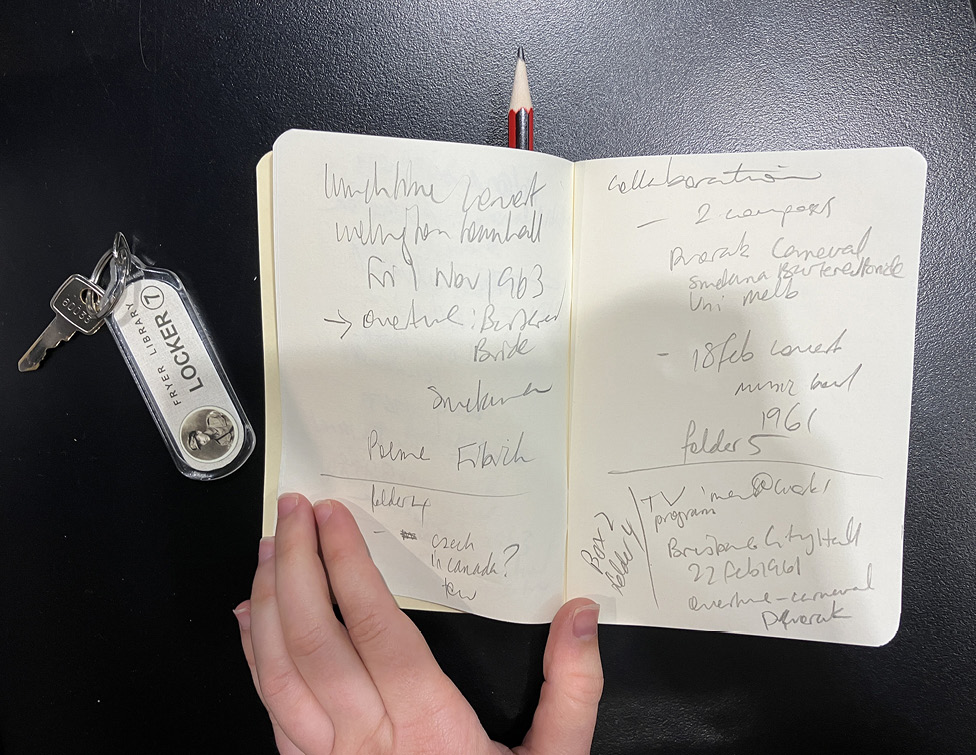
Research Process
There are 16 Boxes in the Rudolf Pekarek Collection. These boxes can fit over fifteen folders of materials each. Some of the correspondence in the collection appears as though it has been typed on translucent tracing paper, fragile as gold leaf.
As I looked through each item, I read and documented what stood out to me. I noted any connections I saw between items as I went. I also kept records of interesting pages within the 10 scrapbooks from Box 16.
Pekarek collected a vast archive of newspaper clippings ranging from reviews of performances he conducted, to other musicians, composers, and concert halls. The more I researched the collection, the more I discovered that Pekarek had programmed many Czech composers throughout his conducting career, including composers Dvořák, Smetana, and Fibich. Krejci is also mentioned.
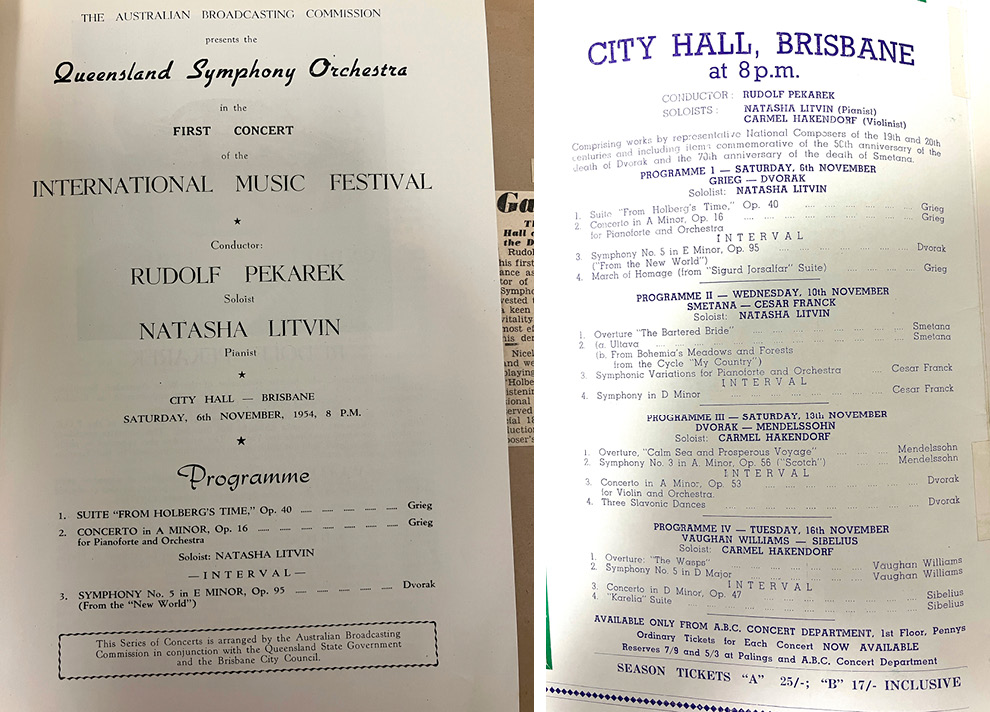
Fig. #4 and #5, Anna Jacobson reference image 2023, excerpt of concert program from the Rudolf Pekarek Papers featuring Czech composers Dvořák and Smetana, Rudolf Pekarek Papers, UQFL153, Box 16, Item 3, Fryer Library, The University of Queensland Library.
Scrapbooking
In Pekarek’s scrapbooks, alongside newspaper article cutouts of performances, there are pieces of ephemera from trips like postcards, hotel room number cards, and tram tickets held in place with brown paper envelopes and paper supports. FioRito et al. state in their article Creative Nostalgia: Social and Psychological Benefits of Scrapbooking that ‘Scrapbooking one’s personally nostalgic memories could be considered a form of storytelling, which is a key component of art therapy, as it promotes self-exploration, resolves trauma, and forges social connections’ (2021, p. 102).
The way the materials have been presented on the scrapbook pages enhances Pekarek’s self-curation and story.
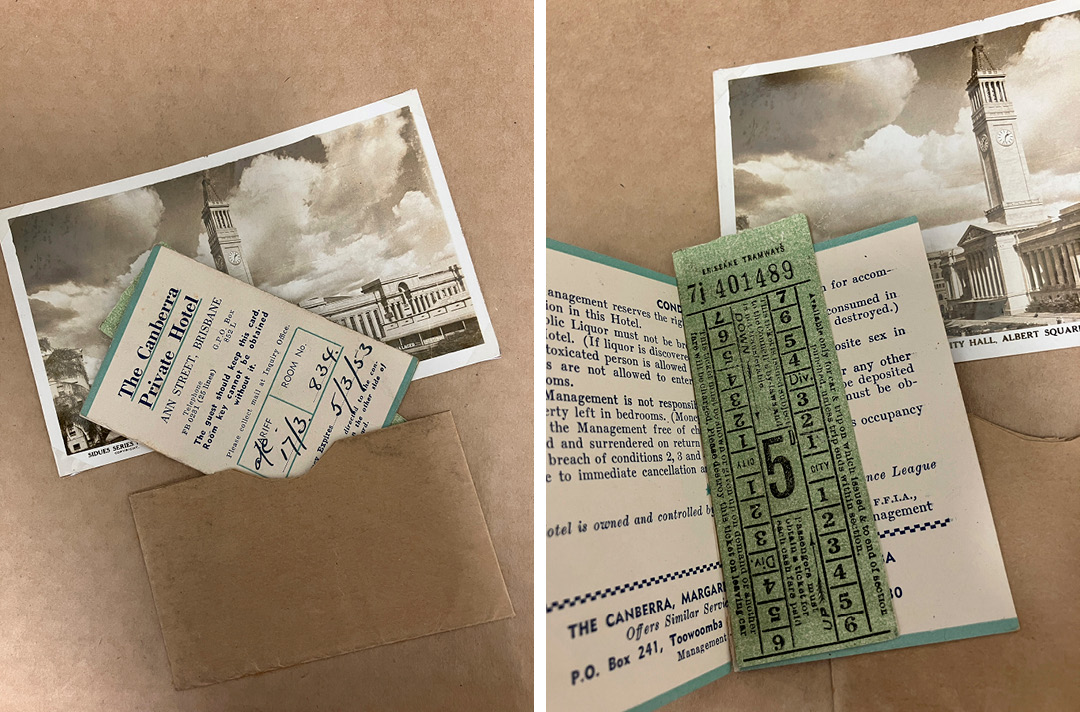
1. A reservation card for The Canberra Private Hotel on Ann Street in Brisbane.
The card instructs the guest to use the card to obtain their key and includes the tariff, room number, and an expiry date of 5/3/53.
2. A photo or postcard of Brisbane city hall partially covered by the reservation card. The clock tower and part of the building are in view.
Image 2 (right) - 3 objects stacked in scrapbook:
1. A green Brisbane Tramways ticket
2. The inside of the Canberra Private Hotel reservation card with rules about Conduct (partially covered by the tram ticket)
3. A photo or postcard of Brisbane City Hall (from a different angle than the other image) partially covered by the other objects.
Fig. #6 and #7, Anna Jacobson reference images from ‘Scrapbook: Tchaikowsky Festival Brisbane, 1953’, Rudolf Pekarek Papers, UQFL153, Box 16, Item 1, Fryer Library, The University of Queensland Library.
The process of looking through these scrapbooks is one of discovery: lifting programs reveal a folded telegram and beneath that, a handwritten letter. Through folding and unfolding these tactile pages, tickets from concerts on tour can be found wedged under postcards.
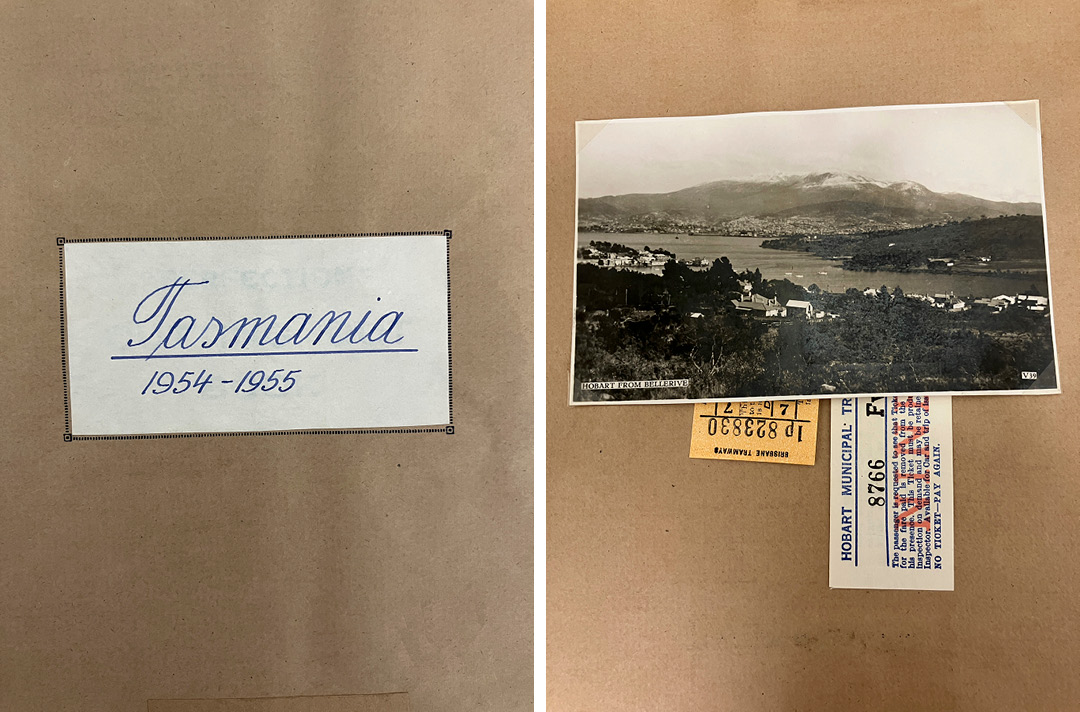
Image 2 (right) - 3 objects stacked in scrapbook:
1. Photo with the caption 'Hobart from Bellerive'
2. An orange 'Brisbane Tramway' ticket (partially covered by the photo)
3. A Hobart Municipal Council Ticket (partially covered by the photo).
Fig. #8 and #9, Anna Jacobson reference images from ‘Scrapbook: Tasmania 1954-1955’, Rudolf Pekarek Papers, UQFL153, Box 16, Item 2, Fryer Library, The University of Queensland Library.
I took reference images so I could access a digitised version of what I had found interesting in each Scrapbook and Box number. This reduced the number of times I needed to return to the Boxes, as I wanted to be careful with handling each physical item. Having my own reference images catalogued in this way is allowing me time for greater reflection. I am now in the process of writing a research article and am assembling my findings from this Fryer Library Collection. I thank the Fryer Library staff for their wonderful support of my project.
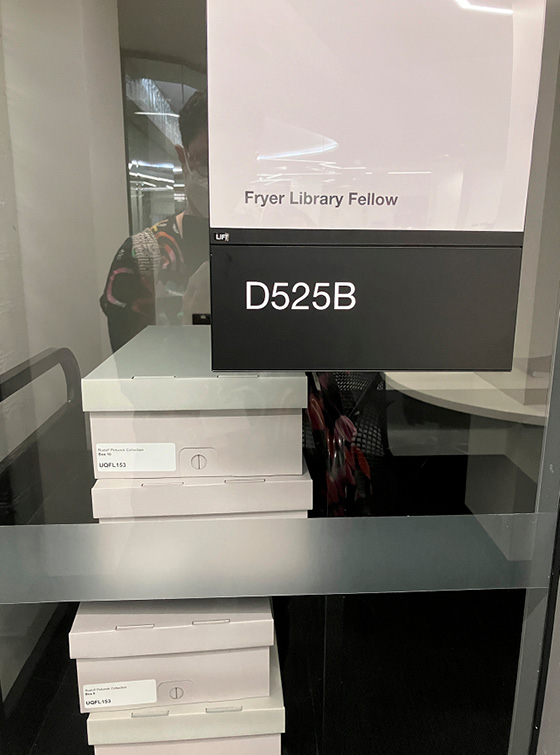
References
Australian Broadcasting Commission. 1952, ABC weekly ABC, Sydney, Detail from Vol. 14 No. 27 (5 July 1952) viewed 16 December 2023 http://nla.gov.au/nla.obj-1324727285
FioRito, T. A., Geiger, A. R., & Routledge, C. (2021). Creative Nostalgia: Social and Psychological Benefits of Scrapbooking. Art Therapy, 38(2), 98–103. https://doi.org/10.1080/07421656.2020.1748986
Fisher, A., & Gilboa, A. (2016). The roles of music amongst musician Holocaust survivors before, during, and after the Holocaust. Psychology of Music, 44(6), 1221–1239. https://doi.org/10.1177/0305735615624772
Queensland Holocaust Museum and Education Centre Ltd. (2023). Music in the camps. Online Museum. https://www.holocaustmuseum.online/zone2b
Sydney Jewish Museum. (1997). Eulogy by Dr B Klug. Sydney Jewish Museum – Where History Has a Voice. https://sjm-web.adlibhosting.com/AIS/Details/museum/1581
UQ Finding Aid. (2023). Collection UQFL153 - Rudolf Pekarek Papers. Fryer Library Manuscripts. https://manuscripts.library.uq.edu.au/index.php/uqfl153
More about Anna and her project
Read Announcing the 2023 Fryer Fellow to learn more about Anna and her project as part of her Fryer Library Fellowship.